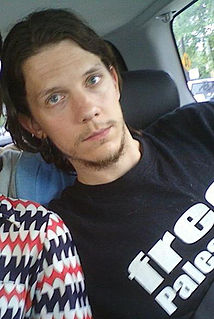A Quote by Iain Banks
Empires are synonymous with centralized if occasionally schismatized hierarchical power structures in which influence is restricted to an economically privileged class retaining its advantages through usually a judicious use of oppression and skilled manipulation of both the society's information dissemination systems and its lesser as a rule nominally independent power systems. In short, it's all about dominance.
Quote Topics
About
Advantages
Both
Centralized
Class
Dissemination
Dominance
Economically
Empires
Independent
Influence
Information
Judicious
Lesser
Manipulation
Occasionally
Oppression
Power
Power Structure
Privileged
Restricted
Retaining
Rule
Short
Skilled
Society
Structures
Synonymous
Systems
Through
Use
Which
Related Quotes
The tragic reality is that very few sustainable systems are designed or applied by those who hold power, and the reason for this is obvious and simple: to let people arrange their own food, energy and shelter is to lose economic and political control over them. We should cease to look to power structures, hierarchical systems, or governments to help us, and devise ways to help ourselves.
"Oppression" or "systems of oppression" operate as a shorthand terms in much writing and speaking so that we do not have to list all these systems of meaning and control each time (i.e. racism, ableism, xenophobia, etc.). I needed a term like that, but "oppression" implies a kind of top-down understanding of power that is at odds with the Foucaultian model I rely on in my work.
Let no one ever shy away from the claim that Jews have power, that Jews have influence. We have learned the terrible lesson of history; that unless we have influence and power, disproportionate to our small numbers - immoral results will occur. We need power. And we must continue to use our power. Power which we earned, power which no one gave us on a silver platter, power which we worked hard for - use that power in the interests of justice.
If you look at capitalism and patriarchy, they're both such hierarchical, competitive, oneupmanship systems. They've trained us all [to think] that power means having all the goods or having the most money or having the most attention or having the most fame. That's not the power that interests me. Actually, the deconstruction of that power is what interests me.
The revolution here is from hierarchical to lateral power. That's the power shift. So increasingly a younger generation that's grown up on the internet and now increasingly distributing renewable energies, they're measuring politics in terms of a struggle between centralized, hierarchical, top-down and closed and proprietary, versus distributed, open, collaborative, transparent. This shift, from hierarchical to lateral power, is going to change the way we live, the way we educate our children, and the way we govern the world.
We have power... Our power isn’t in a political system, or a religious system, or in an economic system, or in a military system; these are authoritarian systems... they have power... but it’s not reality. The power of our intelligence, individually or collectively IS the power; this is the power that any industrial ruling class truly fears: clear coherent human beings.
The most effective way to close down the human mind and to manipulate its sense of self is to program into it some form of dogma. A dogma will always vehemently defend itself from other information and repel any alternative opinion which contradicts its narrow, solidified view. Dogmas become a person's sense of security and means of retaining power, and humanity tends to cling to both until its knuckles turn white. Dogmas take endless forms, and when you can persuade different people to hold opposing dogmas, the manipulation of conflict and control through "divide and rule" becomes easy.
We know that flat and non-hierarchical systems use information best. I've tried to do that with my own company because it works better that way. And society at large will work better as well if we can get rid of these old institutions and hierarchies. New innovations like the block chain can make this possible.






































